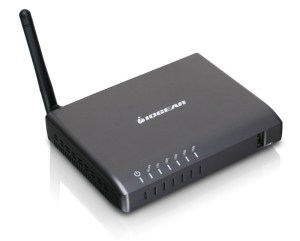
The technology world is literally littered with USB peripherals: tens of thousands of printers, scanners, cameras, hard drives, speakers, video cameras, memory card readers and more all sport USB ports. Of course, while many printers and multi-function devices often come with built-in Wi-Fi these days, versions with Wi-Fi often cost more, and enormous numbers of USB peripherals offer no wireless option. IOGear aims to help solve that with its new 4-Port USB Sharing Station. The device looks like a Wi-Fi router, and sports both Wi-Fi and Ethernet (100Base-T) connectivity, along with four USB 2.0 ports for peripherals. Pop the USB Sharing Station onto your network, then plug your USB peripherals into the Sharing Station—and suddenly you can connect to your USB peripherals from anywhere in Wi-Fi range. And the peripherals aren’t available to just one computer: any user on the network can access them as well.
“Sharing USB peripherals is an easy way to stretch resources while improving the computing efficiency of a home or office setting,”said IOGear senior marketing manager Bill Nguyen, in a statement. “Our work and productivity spaces are cluttered enough, utilizing a Wi-Fi network for device sharing can help de-clutter, while providing many other useful applications.”
Not all USB devices make sense for wireless sharing: Internet-connected TVs aren’t going to be very practical, and sharing a trackball, mouse, keyboard or game controller wirelessly probably doesn’t make too much sense. But printers, copiers, fax machines, scanners, USB storage (think backups or media streaming), and cameras all make sense—using the wireless hub to extend the range of a USB camera might make a quick way to check to see who’s at the delivery entrance without having to leave the desk. If you have a ton of USB peripherals, IOGear offers a USB 2.0 hub extension that can add four more ports to the configuration, bringing the total number of sharable devices to seven. Users configure the station using a Web-based interface or a Windows utility app; the hub works with WIndows XP/Vista/7 and Mac OS X 10.6 or newer.
The 4-Port USB Sharing Station is available now for a suggested price of $99.95.



